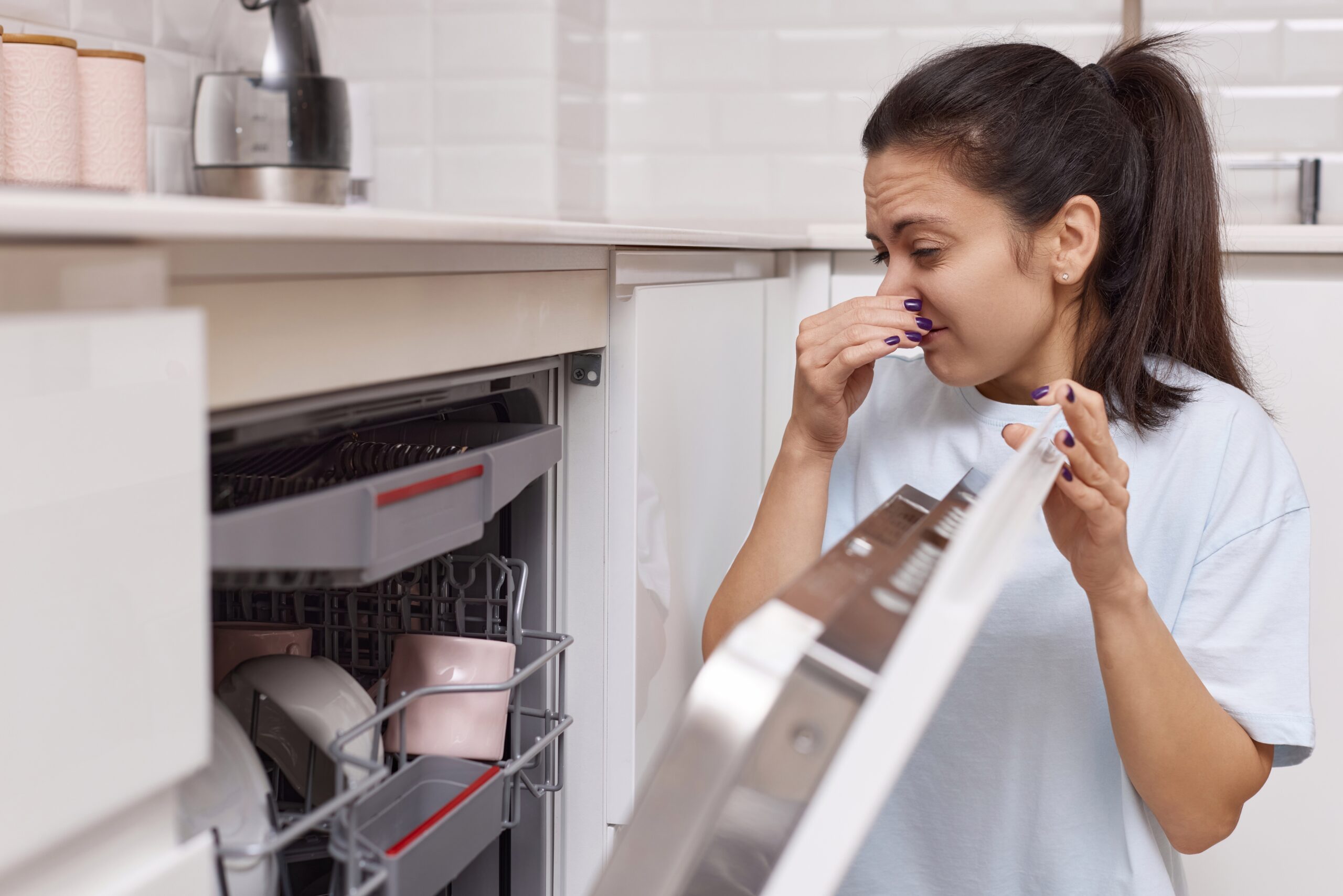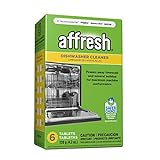To fix a smelly dishwasher, start by cleaning the drain filter to remove trapped food debris. Then, run two separate cleaning cycles: first with white vinegar on the top rack to dissolve grease and odors, and second with baking soda sprinkled at the bottom to neutralize remaining smells. Regular maintenance, including checking the drain hose and cleaning spray arms, will keep your dishwasher fresh and efficient. It’s also important to properly load your dishes.
Ever run your dishwasher only to be greeted by a foul odor wafting through your kitchen? We’ve been there, and let’s be honest, it’s pretty gross. It’s a common misconception that dishwashers, being cleaning appliances, should somehow clean themselves. But the reality is, they need regular maintenance to prevent smells.
If your dishwasher’s been giving off a stench even after a cycle, you’re not alone. Studies show that 20% of Americans never clean their dishwasher, which can lead to accumulated food particles, grease, and soap scum—perfect ingredients for a smelly kitchen companion. But fear not, I’m here to guide you through some simple fixes to banish those bad odors for good.
Why does your dishwasher smell?
OK, let’s discuss the most common culprits behind the unpleasant odors. Food buildup is a primary suspect. More specifically, egg residue left on dishes is often the most common problem, I’ll explain that a little later.
Over time, food particles and debris left on dishes get trapped, leading to a smelly dishwasher. It’s not just the sight of leftover food that’s off-putting; it’s the smell that comes from the decay and bacteria growth, which can be potent.
When food particles are left behind in a dishwasher and begin to decompose, several technical processes occur, primarily involving microbial activity and chemical breakdown.
Washing Dishes With Egg Residue on them?
This may be the most important tip I can give you to prevent a smelly dishwasher. Eggs contain sulfur-rich amino acids, such as cysteine and methionine. When eggs are cooked or heated, these sulfur compounds can break down and form hydrogen sulfide gas, which is known for its characteristic ‘rotten egg’ odor. During a dishwasher cycle, any remaining egg residue on dishes gets heated, potentially releasing this smelly gas. Moreover, if the dishwasher doesn’t completely remove the egg residue, it can lead to bacterial growth, further contributing to the odor. To prevent this, rinse dishes with egg residue before loading them into the dishwasher. This simple step can help keep your dishwasher smelling fresh and clean.
Other Potential Causes for A Smelly Dishwasher
Another frequent offender is grease and soap scum accumulation. These can adhere not only to the dishes but to the interior walls and working components of the dishwasher itself. Just like in a shower, soap scum builds up over time and requires regular cleaning to keep at bay. The combination of grease, residual detergent, and heat creates an ideal environment for odors to develop.
Hard water can also leave deposits, which not only affect the smell but can impede the efficiency of your dishwasher. If you’ve got hard water running through your pipes, you may notice mineral buildup on the heating elements and other parts of the dishwasher. These hard water deposits can not only contribute to a pungent smell but can also lower your dishwasher’s performance levels.
Clogged drains are problematic too. When the water can’t flow freely due to clogging, it can lead to standing water within the dishwasher. This stagnation can be an open invitation for bad odors to set in and pervade your kitchen space.
Quick Fixes for a Smelly Dishwasher
First things first, clean the drain filter. This culprit is usually at the very bottom of your dishwasher’s interior. I can’t emphasize enough how often food debris gets trapped here. In most dishwashers, this filter is easily removable for cleaning. Most are located at the bottom and look like this. A quarter or half turn counter clockwise and the filter comes right out. This is my filter, which hasn’t been cleaned for a few months, which is too long. You can see the buildup of soap and scum.
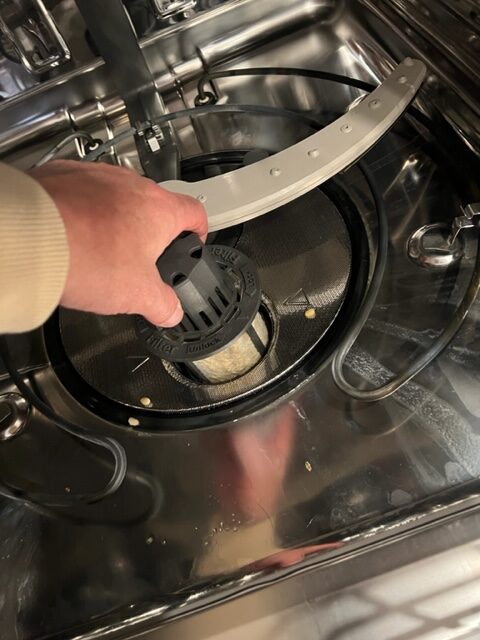
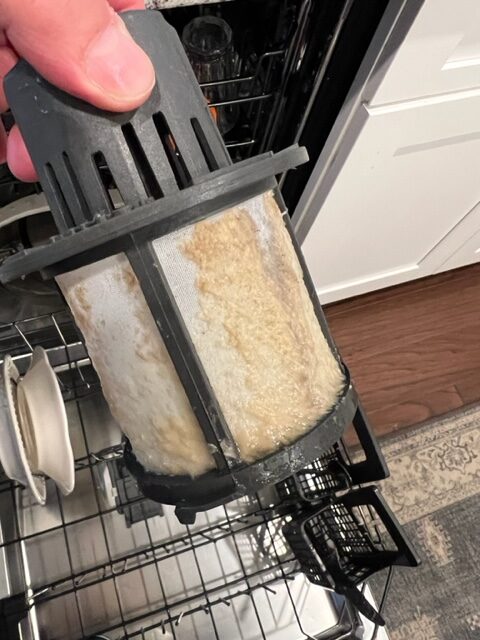
In this case, it was easy to scrub off the buildup with dish soap and a sponge.
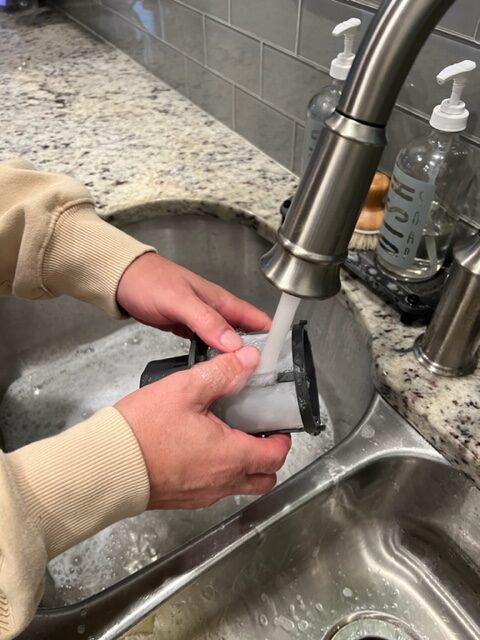
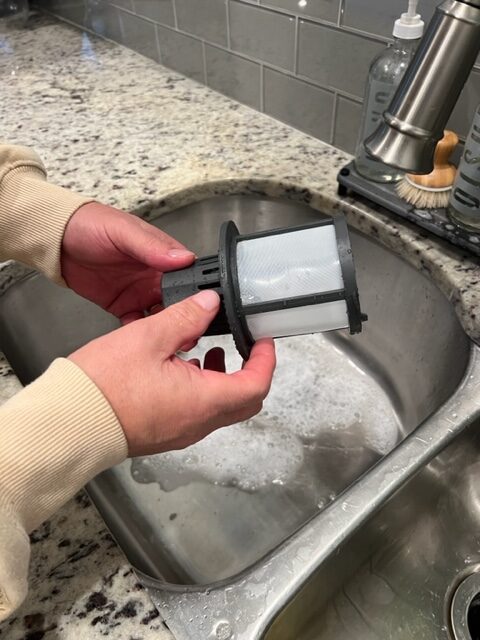
Two Step Vinegar-Baking Soda Cleaning Process
To effectively clean and deodorize your smelly dishwasher, you can run two separate cycles using common household items: vinegar and baking soda. Start by placing a dishwasher-safe cup filled with white vinegar on the top rack of your empty dishwasher. Run a complete cycle using the hottest water setting available. The vinegar will help to dissolve grease, grime, and any lingering odors. After the vinegar cycle is complete, sprinkle a cup of baking soda across the bottom of the dishwasher. Run a short cycle, again with the hottest water setting. The baking soda will not only help in further cleaning the dishwasher but also neutralize any remaining odors, leaving your dishwasher fresh and sparkling clean. This simple two-step process is an easy and natural way to maintain your dishwasher.
Safety Tip: Caution With Vinegar
The Chemical Engineer and Safety guy comes out in me when I think about suggesting the use of vinegar. It’s important to understand what substances vinegar should not come into contact with. Vinegar is an acidic solution (acetic acid), it can react with certain materials and chemicals as follows:
- Chlorine Bleach: Never mix vinegar with bleach! This combination produces toxic chlorine gas, which can be harmful when inhaled. If the dishwasher has been previously cleaned with bleach, it should be thoroughly rinsed and aired out before using vinegar.
- Rubber Parts: Prolonged exposure to vinegar can degrade rubber gaskets and hoses over time. While occasional use is generally safe, soaking rubber parts in vinegar for extended periods can be problematic.
- Cast Iron and Aluminum: Vinegar can corrode cast iron and aluminum. If the dishwasher contains components made of these materials, they should not be exposed to vinegar for long durations.
- Natural Stone Surfaces: If the dishwasher is near countertops or surfaces made of natural stone like granite, marble, or limestone, caution should be taken to prevent vinegar spills. Vinegar can etch and dull the finish of natural stone.
- Dishwasher Detergents with Ammonia: Check the ingredients of dishwasher detergents. Mixing vinegar with ammonia-based products can create harmful vapors.
- Certain Plastics: Some plastics may be sensitive to acidic solutions. Although most dishwashers are designed to handle a range of cleaning products, it’s still wise to avoid prolonged exposure of plastic parts to vinegar.
- Enamel-coated Appliances: Some dishwashers have enamel coatings that can be damaged by acidic cleaners like vinegar. It’s important to check the manufacturer’s guidelines before using vinegar on these surfaces.
Commercial Cleaning Products
If your not into the 2 Step Vinegar-Baking Soda Process, and you want a more direct method, here’s a great product we have used for years. You can Pick it up on Amazon for less than $10, the picture below is a link to purchase it on Amazon if your interested in trying it.
Check the drain hose
If you’ve scrubbed your dishwasher and used the cleaning methods discussed above, you are rinsing your dishes prior to putting them in the dishwasher, but still notice an unwelcome odor, the drain hose might be the culprit. I can’t stress enough how a clogged or kinked drain hose can trap dirty water, potentially leading to mold or mildew formation.
Start by locating the drain hose connected to the dishwasher. It usually runs from the dishwasher to the kitchen sink’s plumbing or garbage disposal. Any obstruction in the hose can cause water to back up, which hampers the dishwasher’s ability to clean effectively and may cause odors.
High Loop! This is something that almost all homeowners do not know! If your dishwasher drain hose does not have a high loop, meaning that it is connected in a way such as shown below, dirty water from your sink can make it’s way back into your dishwasher. You can accomplish this with zip ties by securing it to a high spot under your sink.
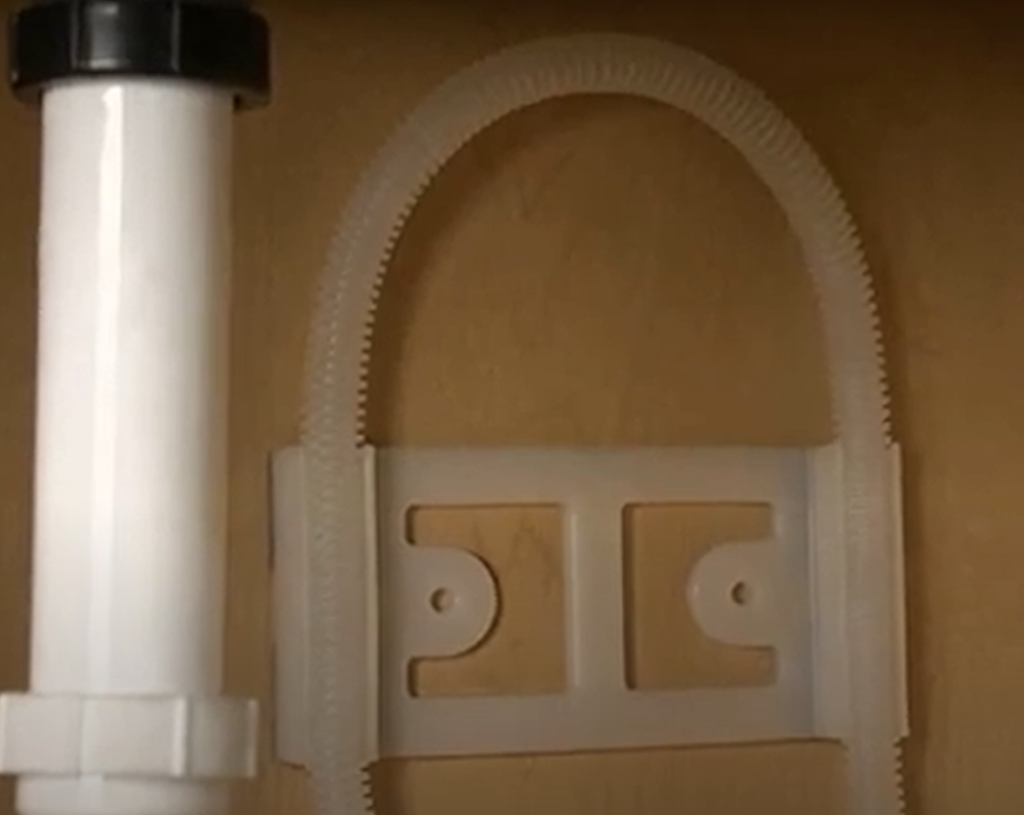
Clean the spray arm and nozzle
Let’s turn your attention to the spray arms and nozzles. I’ve found these are often overlooked components that play a role in your dishwasher’s functionality and can be the source of that unwanted smell if they’re not properly maintained.
Removing the Spray Arms
It’s surprisingly simple to clean the spray arms. Here’s how I do it:
- Open the dishwasher and remove the bottom rack to access the arms.
- Twist or unclip the spray arms gently to detach them from their brackets. If you’re unable to remove the upper spray arm, don’t sweat it; some models have fixed upper arms.
- Once the spray arms are removed, inspect the mounting brackets for any buildup, cleaning them thoroughly.
Cleaning Process
- Hold the spray arms under warm running water to rinse off any residue.
- Use a soft brush, like a toothbrush, to dislodge mineral deposits or food particles that might be clogging the nozzles.
- For in-depth cleaning, use tweezers or a toothpick to remove any blockages from the water jets. Be careful not to damage the nozzles as you work.
Reassembly and Testing
After making sure the spray arms are clean:
- Reattach them to their brackets. It’s essential they’re secure to prevent wobbling during operation.
- Run a short test cycle to ensure water flows evenly through the nozzles.
Frequency of Cleaning
To keep that fresh smell and efficient performance, I recommend cleaning your spray arms every two to three months. Trust me, it’ll make a difference.
Clean The Door Seals
Lastly, don’t forget about the bottom lip behind the door, a common hiding spot for food debris and grime. Open the door fully and, with a damp microfiber cloth or soapy sponge, scrub away any accumulated sludge. A good wipe down of the bottom edge of the door while it’s open can also prevent future odors from developing. With these areas addressed, your dishwasher should be one step closer to smelling fresh once more.
Regular Upkeep Is Key
Running a dishwasher cleaning cycle isn’t just a one-time fix—it’s part of ongoing maintenance. But how often should this be done? Well, that depends. If I use my dishwasher frequently or load it with heavily soiled dishes, monthly maintenance might be necessary. However, for lighter use, a quarterly cycle could suffice. Keeping tabs on the cleanliness of my dishwasher ensures that I’m not met with unpleasant surprises each time I go to unload my clean dishes.
Preventing future dishwasher smells
Servicing your dishwasher at least once a year is crucial for both preventing odors and extending the lifespan of the appliance. Regular maintenance ensures that all components are functioning properly. A Service Professional can tackle key areas prone to causing smells:
- Drain filter: Often captures food particles and can become a source of smell if not cleaned.
- Spray arms: Can get clogged with debris, affecting efficiency and cleanliness.
- Interior surfaces: Where residue may build up and contribute to unwanted odors.
During a service visit, other elements like the gaskets and drainage system are checked for any leakage or water buildup. Addressing these problems not only reduces odor-causing bacteria but also ensures optimal drainage, so there’s less chance of standing water—and less chance of smells.
In between professional servicing, here’s what I like to do to keep the dishwasher in top-notch condition:
- Run frequent cleaning cycles: Without dishes and using vinegar or a dishwasher cleaner.
- Dry the dishwasher post-use: Leaving the door open briefly helps to air it out.
- Check for obstructions: Regularly inspect the gasket, drain hose, and filters.
Final Thoughts
Tackling a smelly dishwasher doesn’t have to be a daunting task. With the simple steps I’ve shared you’re well on your way to a fresher appliance. Remember the power of baking soda and vinegar to break down grime and scale while ensuring your machine is free of food debris and standing water. Incorporating these tips into a regular maintenance routine will help keep those unpleasant odors at bay. So give your dishwasher the attention it deserves and you’ll be rewarded with a clean, odor-free kitchen companion.
This is one of the many Homeownership Essential knowledge tips all homeowners should know. Check our our post for more tips and knowledge bits in our Post: Homeowner Essentials: Tips All homeowners should know

